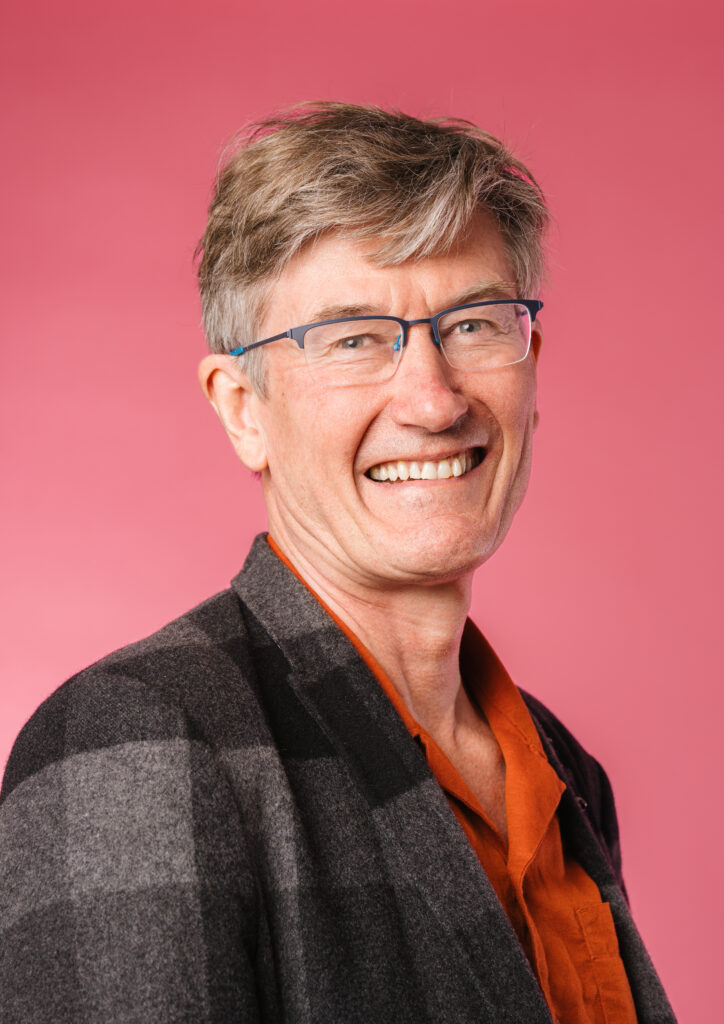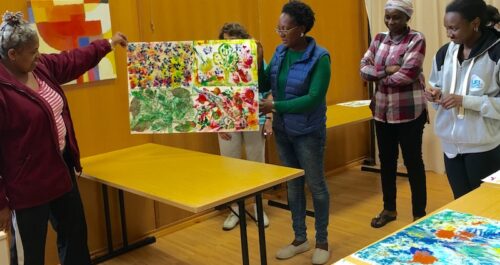

Trevor Burgess
Audio Player
TB: Trevor Burgess
INT: Interviewer
INT: My name is Phi Tran and I’m here interviewing Trevor Burgees for the 30th anniversary of Rosetta Arts. Please state your name.
TB: Trevor Burgess. I was born in and grew up in the north of England.
INT: State your relationship with Rosetta.
TB: I’m a trustee on the board for, think it’s about, five or six years.
INT: Over those five or six years, what has been your impact Rosetta’s and the borough of Newham?
TB: It’s been really heart-warming to how see the power Rosetta and how it has grown and flourished over the period that I’ve been involved with Rosetta, em, in terms of all sorts of things; the scale of activities; the engagement; the numbers of people who are involved; the staff, the staff team; the turnover of the organisation and, just generally seeing it a wonderfully friendly place and somewhere that, I think, more and more people are feeling a genuine connection with.
INT: You’re also involved with one of our other projects, would you like to tell us about the other project you are involved in.
TB: Yes, I work with an organisation, well I’m a painter, and I also part time work with an organisation called Renova and we’ve done a couple of projects in partnership now with Rosetta. One of them was working with young people at risk of getting involved in crime called I Design My Future and we ran in partnership with Rosetta. There was an element to it, The Art Stars and Makers Workshops here at Rosetta to which we supported with Renova mentoring for young people around the idea of getting into a creative career. Then there is some three-year programmes. Each year there was also like a summer camp or workshop for young people in the borough.
INT: Can you tell me about the reception from young people that you have had on the project?
TB: Er, we just about got it going and we had over a hundred people into the initial taster of day and everything at here Rosetta and a lot of enthusiasm and youth workers a getting involved and then the pandemic, so we it was it was more challenging to run it over the over the two years when, obviously, was we couldn’t do things physical activities we hoped to do, but we still manage the summers, summers were easier so that some of workshops went really well and they were done outside. There’s a film made and that was really really a nice outcome, and in the last years the since pandemic subsided a bit, it’s all picked up again as well.
INT: Can you tell me more about the summer workshops?
TB: Em, well, in the first year, people young people and worked in a park in Newham making a film about identity and their experiences so it was really nice.
INT: Is that film still available to watch on-line?
TB: Yes, yes, it’s on the Rosetta website, so yeah.
INT: What would you like to see in future programming from Rosetta?
TB: Em, I guess, the work with young people I think, is so important and I think, particularly to at the moment when, in schools and the arts, are not getting the attention that they should do as part of the curriculum, and also because, I think, pupils at school have a lot of pressure on them now through the curriculum, so keeping those options open to be able to do things outside school that are creative, and of course it’s a hugely growing area for careers and the creative Industries, as they’re called, and I think having the opportunity for young people to pursue their creativity and see that it’s, it’s a road that sometimes maybe parents and teachers might guide them in other directions, hopefully that’s changing a little bit now, but to be able to see that there’s a future and even if it isn’t moving into a career into study, just in terms of people’s well-being in terms of your self-development, your confidence and all sort of things. I think it’s really important.
INT: Could you elaborate and tell me how the arts provide those services to the borough?
TB: Eh, by being here and having that offer. One of the things, one of the reasons I am a trustee is that I think Rosetta is fairly unique in London, even elsewhere, in that being very based in the community as a community hub specialising and visual arts. There is, granted out, there are a number of community outs organisations across London and elsewhere that have a broader remit if you like, but Rosetta’s focus on visual arts is something quite distinctive.
INT: Do you think this focus on visual arts is what brings people here and is what kept us going for 30 years?
TB: Yes, I think so, I mean the fact that you’ve got the facilities here, because visual arts is something that needs, you needs a certain amount of equipment and a suitable space to do it, and specialist teachers and all sorts of different areas; collage; ceramics; doing printmaking; doing drawing; painting; craft making; all things that are physical, things at you make with your hands and you learn through it, and I think it’s, it’s really important activity to time when a lot of what we do is on screen, and that you get the real connection when you’ve done something with your own hands.
INT: What would you like to see for the future of Rosetta?
TB: Well, there’s so, so much scope, I mean, I would I’d love to see Rosetta being a little bit more secure in is building base and finally finding a space with a bit more security around for it as a building, and I think that that could potentially open up all sorts new opportunities. I’m particularly interested, as well, in the Artist Accelerator Programme and those people because I think that working with young and emerging artists, and supporting their development, and then those people come, in as people here have, and they can work as tutors as mentors. So, I think that’s a really interesting development and there’s, there’s like a pathway really of working with young, young children, working with people during schools working with people who want to get into careers, people wanting to get into education and then once, once people get started making work, or later in life and working with older people ,so there’s the whole there’s a whole, sort of, interconnected pathway I think that Rosetta can really offer to people at all stages of life.
INT: Talk more about the programme on offer here.
TB: The things that are on offer, yeah, yes well, mean, there’s The Art Stars and The Young Makers Programme, as I say, for the young people. Then Rosetta does programmes around well-being which have been really, I think, more significant, after the pandemic and current situation, so offering support around well-being through creativity, working with people where there are mental health issues and work with older people as well, there is specific, all sorts of very practical classes that are done here as well drawing, photography and ceramics, so yes and the food! We must mention the food! There’s even a kitchen here, which I think is great, and I travel a lot, and if you go to Italy, food is one of the creative industries, and I think food is something that brings people together very nicely as well.
INT: Can you tell me how you first heard of Rosetta?
TB: Er, it was a colleague of mine because I’ve worked for a long time in the way the arts can support people into work and can support all sorts of skills development, confidence and motivation and for people outside formal education, so that was something that there is a very interested in, and the colleague of mine pointed me to Rosetta and said that they were looking for people to be involved, and I was just immediately really impressed from the beginning really with the organisation. It was really effectively run and managed as well, which I think it’s really important and with the spirit of Rosetta and the friendliness and the fact that it’s a place that people really feel welcomed, and its place that people love to come.
INT: Do you know when that was?
TB: I’m trying to remember it might have been 2016, something around then.
INT: How has it changed?
TB: I mean, one of one of the key developments from my point of view as a trustee, has been the fact that Rosetta did extraordinarily well to become an Arts Council National Portfolio Organization and at a time when, em, the Arts Council was moving its funding away from London. Er, I think that was a real recognition of how another, very distinctive thing, about Rosetta Arts organisation is that it’s based in its community a lot of other arts organizations have real trouble engaging with people even, even on their doorstep, em, and Rosetta is very much a community place based and I think that’s something that is really important.

